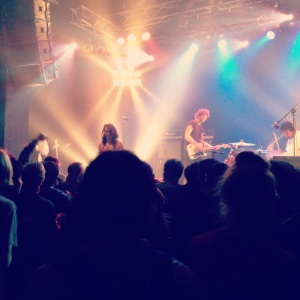Throughout my undergraduate college career, I interned backstage in the production department of the Fox Theatre in Boulder, Colo. One night in 2010 as I was helping load an opening band out of the venue, the band’s guitarist came up from the green room, stopped on the stage and looked me up and down.
“What are you, somebody’s sister?” he said.

His bandmates promptly apologized for him, letting me know he was drunk. I continued pushing gear out into the back alley with my fellow crew members. I probably left around 2 or 3 a.m. My manager thanked me as I left unpaid for my 12-hour shift.
I worked this internship despite my friends and family suggesting I quit; they felt it was sucking my time and energy. I did it because I love live music. I wanted the experience. Taking on the story of women working in live music in Colorado was not about me, though. I tell this in full disclosure as a woman who has worked in live music and has been treated both respectfully and disrespectfully.
Working on a story about women in music and having the privilege to interview so many genuinely talented, hardworking and kind people over the past two months has made me realize many things, the least of which is that I love interviewing people. In a world which seemingly promotes less communication and genuine human connection as it creates bigger divides, the feedback I received in reaching out and speaking with everyone involved with this project was immense. The process allowed people to open up on the issue and I have learned so many different sides to this story; however, I often had to stifle my own opinions in the process.
Feminist has become a dirty word in our current media-infiltrated world. Its purpose and meaning has been sullied. The demanding political, social, and physical work women have done for centuries and continue to do today is undermined by the natural progression of linguistics and convoluted politics.
In conducting my research for this project, I looked into numerous scientific studies regarding biological differences between genders, societal expectations and media influences, and the resulting effects on girls’ and women’s self-esteem. In a world of internet trolls, critics and feminist-bashers, showing scientific evidence for the need for equality should not be necessary, but it is. It’s necessary in a world where women are begging and screaming to be heard because they are told they are wrong — that they’re part of the problem. In our world of excess, the media has certainly gone overboard in its finger-pointing and blame-gaming; however, that certainly does not diminish the fact that inequality exists across a wide spectrum.
Women are asking for a voice in a society that is selling their souls for cheap, degrading sexual lewdness and indecency. It’s a society telling them they are worth less than their abilities, minds and goals. In modern day Western economies, businesses and industries are willing to give less than equal pay to different genders and races. Instead of talking about this, we bury the issue within the recesses of other societal and governmental problems. We shake our heads, scoff at the word “feminist” and say, “Ugh, not another one!”
Feminism is not a bipartisan issue, yet the media and society have fashioned it into one. Instead of looking at this word as an us-against-them term, why not approach it for what it means rather than what it sounds like? Etymology is interesting on its own; however, downplaying issues related to gender equality because of media sensationalism is not a way to fix those issues. We need to be willing to talk, whether that means using the word “feminism” or not.